Pulse of the Week is a newly launched newsletter that presents not only the issues of the day in Ukraine, but also presents public opinion on those issues, and the personalities involved.
Pulse of the Week is a joint project of the Active Group and the Center for Research on Corporate Relations. Here we present the first edition of what will be a weekly news digest.
1. Businessman Igor Kolomoisky was arrested
During the week, it became known that Ihor Kolomoisky, a Ukrainian businessman, as well as Odessa businessman Boris Kaufman, were arrested.
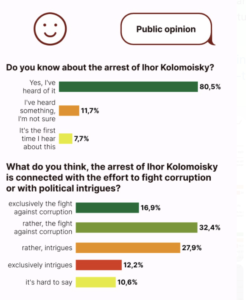
Businessman Ihor Kolomoisky was taken into custody for 60 days by a court decision (preventive measure). The SSU suspects the businessman of fraud and money laundering. Kolomoisky has the right to be released on bail of 509 million hryvnias (12.7 million euros).
Kolomoiskyi’s lawyers filed an appeal against his arrest, but bail has not yet been paid. So the famous Ukrainian businessman is currently in the pre-trial detention center.
Ihor Kolomoiskyi is a business magnate who owned assets in the banking, metallurgical, energy and media spheres. During the 2019 presidential campaign, Kolomoiskyi provided media support to Volodymyr Zelenskyi and referred to him as his business partner.
After russia’s full-scale invasion of Ukraine started, Kolomoisky lost a large part of his business empire, as well as his billionaire status. In particular, in November 2022, the shares of the largest assets of Ukrnafta and Ukrtatnafta were alienated in favor of the state.
President of Ukraine Volodymyr Zelenskyy did not directly comment on Kolomoiskyi’s arrest. However, in his daily address to Ukrainians, he stated that the law must work and thanked Ukrainian law enforcement officers “for their determination to bring to a just outcome each of the cases that have been stymied for decades.”
Sources: Informator, Ukrainian Pravda, UNIAN
2. The Verkhovna Rada restored electronic declaration for officials, but the European Parliament is asking to veto the law
On September 5, people’s deputies restored the requirement of declaring the property for civil servants. But the law was immediately criticized both in Ukraine and in the EU. The fact is that the Ukrainian parliamentarians kept their declarations closed for public access for another year.
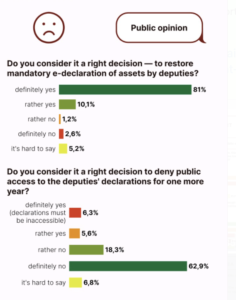
As one of the people’s deputies told the UNIAN agency on the condition of anonymity, elected representatives do not want to open access to their declarations because many of their families live abroad, rent apartments there, and access to information about their property and expenses will allow tracking where they are. This can be used by the russian side.
Instead, Yaroslav Yurchyshyn, the first deputy chairman of the Verkhovna Rada Committee on Anti-corruption Policy, wrote on Facebook: “Most of the arguments in support of a closed register are manipulation, the purpose of which is to delay for as long as possible the moment when they have to give report about vacations in Dubai and new estates in Pechersk.”
Deputies of the European Parliament appealed to Volodymyr Zelenskyi with a request not to sign the law and to open access to the register of declarations, German MEP Michael Gahler said.
Reference: electronic declaration for Ukrainian civil servants was implemented in 2016. After the start of the russian invasion in February 2022, e-declaration became optional, and access to the registry was closed. However, the European Union insists on restoring this anti-corruption norm as a prerequisite for Ukraine’s membership in the EU.
Sources: Suspilne, Ukrainian Pravda, UNIAN
3. Ukraine’s Ministry of Defense received a new leader
This week, the People’s Deputies voted for the resignation of Oleksiy Reznikov from the position of Minister of Defense and the appointment of Rustem Umierov instead.
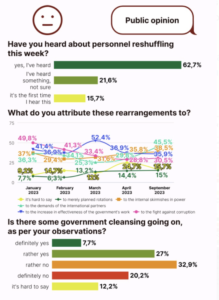
On September 5, the Verkhovna Rada of Ukraine dismissed Oleksiy Reznikov, who had held the position of Minister of Defense since November 2021. During this time, he established cooperation with Western partners of Ukraine – in particular, regarding the supply of weapons and training of the Ukrainian military. However, he was involved several times in corruption scandals. In particular, regarding the purchase of eggs and jackets for army men at inflated prices. Reznikov rejected the accusations, calling them made-up.
Reznikov was succeeded by Rustam Umierov, who previously headed the State Property Fund of Ukraine. Umierov is an ethnic Crimean Tatar, an economist by profession. After the beginning of the russian invasion, Umierov was part of the Ukrainian delegation at the negotiations with russia; he also participated in the negotiations regarding the exchange of prisoners.
Introducing the new minister, the President of Ukraine expressed his belief that Rustem Umierov “can restart the work of the Ministry of Defense.”
Umierov himself declared zero tolerance for corruption. “In my philosophy, corrupt officials are equal to terrorists, and there is no negotiating with terrorists. Our plan is to make corruption impossible,” Umierov emphasized.
Sources: Suspilne, Ukrinform, Radio Svoboda
4. Blinken visiting Ukraine and new aid from the USA
The week wass marked by Antony Blinken, the US Secretary of State, visiting Ukraine, and a new aid package from the USA to Ukraine.
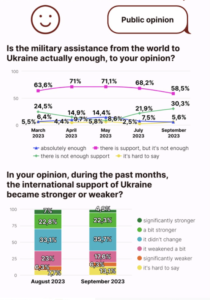
The US Secretary of State arrived in Kyiv for meetings with President Volodymyr Zelenskyi and Minister of Foreign Affairs Dmytro Kuleba. He also announced a new aid package for Ukraine.
According to Antony Blinken, the aid package will include “important demining assistance”. The US Secretary of State noted that the package of more than $665 million is designated for military and civilian security assistance, as well as millions of dollars in support of the Air Defense of Ukraine, and other spheres. The United States will also allocate another 300 million for additional needs.
On September 6, the US Department of Defense announced a new package of military aid to Ukraine in the amount of $175 million. The 120-mm shells with depleted uranium for Abrams tanks are also included in it. “The United States will continue to work with its allies and partners to enable Ukraine to meet its immediate warfighting needs and long-term security assistance needs,” the ministry added.
The Kremlin condemned Washington’s decision to transfer such ammunition to the Ukrainian Armed Forces. The press secretary of the russian president, Dmitriy Peskov, said that this could cause a significant increase in the incidence of cancer and other diseases.
In the USA, they’ve stated that shells with depleted uranium do not cause cancer. Neither the Centers for Disease Control, nor the World Health Organization, nor even the IAEA see a link between cancer and these munitions.
Sources: Suspilne, Ukrinform, European Pravda
5. A russian drone fell on the territory of Romania
On the night of September 4, during the attack of the russian federation on the territory of Odesa region, the detonation of two drones was recorded on the territory of Romania.
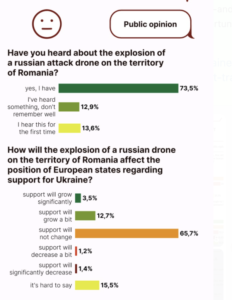
In Romania, they were denying this information for several days. Only on September 6, the Minister of Defense of Romania, Angel Tilvar, confirmed that the wreckage of a russian drone was found on the territory of the country.
A little earlier, the Secretary of the National Security and Defense Council of Ukraine, Oleksiy Danilov, made a disappointing remark about NATO not reacting properly to russian drones entering the territory of Romania and exploding there. “This way, you’ll end up having it boiling, but you’ll be still saying it is cold,” he said.
Romanian President Klaus Iohannis called the downing of a russian drone on the country’s territory an “unacceptable situation” and a serious violation of sovereignty.
Romania informed its NATO partners about the fall of fragments of a russian drone on its territory. This happened at the meeting of the North Atlantic Council on Wednesday, September 6. The Alliance stated that they express “firm solidarity” with Romania. “We continue to closely monitor the situation and remain in close contact with our ally Romania,” NATO said in a statement.
Reacting to the incident, NATO Secretary General Jens Stoltenberg emphasized that there is no data to indicate that Russia deliberately attacked the territory of Romania with attack drones. “We are waiting for the results of the ongoing investigation … we also had other incidents in Poland and beyond. This is the reason we have increased our vigilance,” Stoltenberg stressed.
Sources: Suspilne, Ukrainian Pravda, BBC, Ukrinform
6. Will there be changes in the vector of support for Ukraine by European countries?
This week, in Hungary there have been talks about blocking Ukraine’s entry into the EU, Belgium refused to provide F-16 aircraft, and Poland closed a center for Ukrainian refugees.
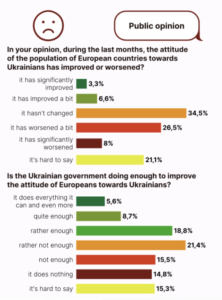
Hungary can block future steps of Kyiv towards Ukraine’s accession to the European Union. One of the reasons named was the “oppression” of the Hungarian national minority, said the political advisor of the Hungarian Prime Minister, Balázs Orbán. According to him, Ukraine’s position is “absolutely unacceptable” and the Hungarian government will not support EU expansion until this problem is resolved.
At the same time, the European Commission says that Ukraine needs to make more progress in this matter.
Belgium declared that they would not be able to hand over F-16 aircraft to Ukraine.
The army leadership believes that the planes are in bad condition. “It’s not that we don’t want to, but when our planes are taken out of service, they are worn out. These planes had already flown for so many hours that their structure was worn out. You can’t send planes to Ukraine that you wouldn’t use yourself,” said Lieutenant Frederic Goetynck.
Poland’s largest reception center for Ukrainian refugees was closed. It was located in Nadarzyna, about 30 km from Warsaw.
According to the press secretary of the Mazovian region, the center was established as temporary. Its closure was justified by an extremely small number of Ukrainian refugees arriving in the region. It is noted that up to 9,000 Ukrainian refugees were accommodated in the center. The last 300 people who lived there were transferred to other centers.
Sources: Espresso, Ukrainian Pravda, UNIAN
Main image: By Rgm38 – Own work, CC BY-SA 4.0, https://commons.wikimedia.org/w/index.php?curid=115624281
———————————————————————————————————————————–

Follow EU Today on social media:
Twitter: @EU_today
Facebook: https://www.facebook.com/EUtoday.net/
https://www.facebook.com/groups/968799359934046
YouTube: https://www.youtube.com/@eutoday1049




